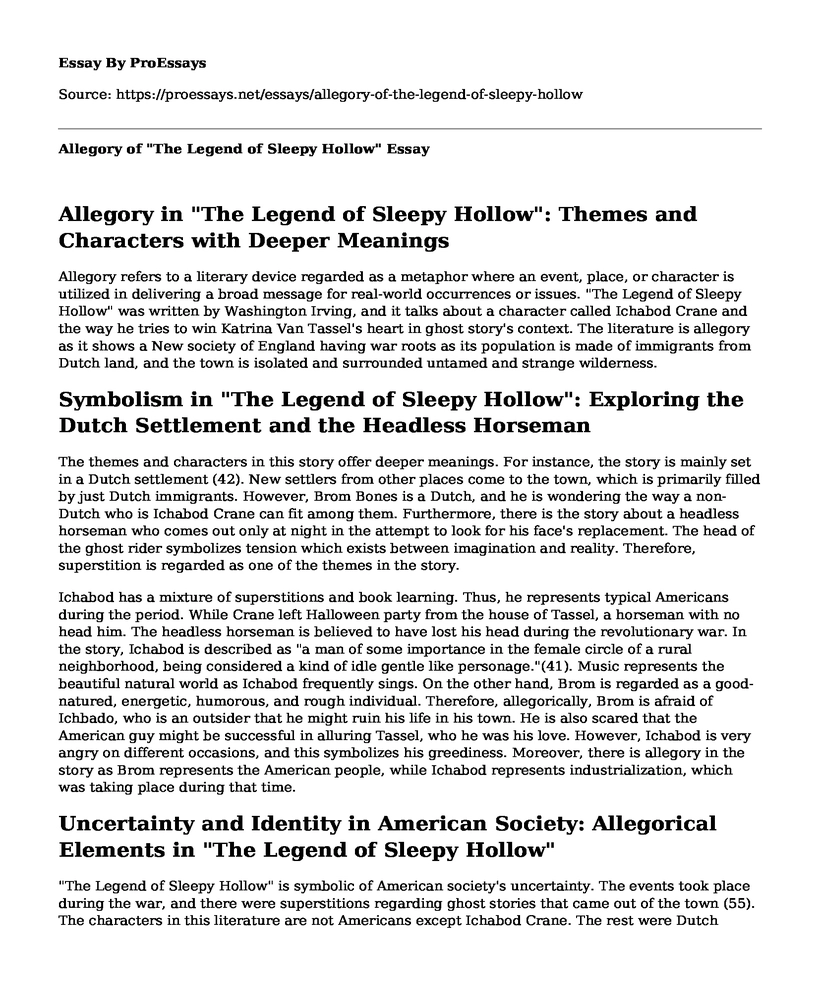Allegory in "The Legend of Sleepy Hollow": Themes and Characters with Deeper Meanings
Allegory refers to a literary device regarded as a metaphor where an event, place, or character is utilized in delivering a broad message for real-world occurrences or issues. "The Legend of Sleepy Hollow" was written by Washington Irving, and it talks about a character called Ichabod Crane and the way he tries to win Katrina Van Tassel's heart in ghost story's context. The literature is allegory as it shows a New society of England having war roots as its population is made of immigrants from Dutch land, and the town is isolated and surrounded untamed and strange wilderness.
Symbolism in "The Legend of Sleepy Hollow": Exploring the Dutch Settlement and the Headless Horseman
The themes and characters in this story offer deeper meanings. For instance, the story is mainly set in a Dutch settlement (42). New settlers from other places come to the town, which is primarily filled by just Dutch immigrants. However, Brom Bones is a Dutch, and he is wondering the way a non-Dutch who is Ichabod Crane can fit among them. Furthermore, there is the story about a headless horseman who comes out only at night in the attempt to look for his face's replacement. The head of the ghost rider symbolizes tension which exists between imagination and reality. Therefore, superstition is regarded as one of the themes in the story.
Ichabod has a mixture of superstitions and book learning. Thus, he represents typical Americans during the period. While Crane left Halloween party from the house of Tassel, a horseman with no head him. The headless horseman is believed to have lost his head during the revolutionary war. In the story, Ichabod is described as "a man of some importance in the female circle of a rural neighborhood, being considered a kind of idle gentle like personage."(41). Music represents the beautiful natural world as Ichabod frequently sings. On the other hand, Brom is regarded as a good-natured, energetic, humorous, and rough individual. Therefore, allegorically, Brom is afraid of Ichbado, who is an outsider that he might ruin his life in his town. He is also scared that the American guy might be successful in alluring Tassel, who he was his love. However, Ichabod is very angry on different occasions, and this symbolizes his greediness. Moreover, there is allegory in the story as Brom represents the American people, while Ichabod represents industrialization, which was taking place during that time.
Uncertainty and Identity in American Society: Allegorical Elements in "The Legend of Sleepy Hollow"
"The Legend of Sleepy Hollow" is symbolic of American society's uncertainty. The events took place during the war, and there were superstitions regarding ghost stories that came out of the town (55). The characters in this literature are not Americans except Ichabod Crane. The rest were Dutch settlers. Irving's writing is filled with fear due to the darkness from the woods. There is no clear American identity since the society is mainly filled with several unanswered questions and doubt.Conclusion
In conclusion, allegory is in the "The Legend of Sleepy Hollow," and it is depicted through themes and characters. For instance, the story is in Dutch settlement, and this makes Brom wonder how a non-Dutch can fit among them. There is also a headless horseman that symbolizes tension existing between imagination and reality. Music is also used in symbolizing the natural world. As Brom represents the American people in the story, Ichabod represents industrialization that took place during that time.
Cite this page
Allegory of "The Legend of Sleepy Hollow". (2022, Mar 27). Retrieved from https://proessays.net/essays/allegory-of-the-legend-of-sleepy-hollow
If you are the original author of this essay and no longer wish to have it published on the ProEssays website, please click below to request its removal:
- Critical Essay on Merchant of Venice by William Shakespeare
- "The Yellow Wallpaper" as an Example of a Gothic Allergory Essay
- Analyzing Caliban as a Tragic Hero in Shakespeare's The Tempest
- Essay on Immigrants' Broken Promises in USA: Frustration of Expectations
- Essay Example on Leslie Marmon Silko: Ordinary Connections in Extraordinary Literature
- Essay Example on Friedrich Nietzsche: Radical Aristocrat, Poet & Prophet
- Passing By Nella Larsen - Book Review Example







